

Information & Digital Literacy for University Success. How to Cultivate Continuous Learning to Stay Competitive. Even during the midst of a pandemic, self-improvement is still a crucial aspect to our lives today.
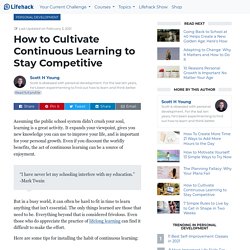
There are tonnes of articles that you could be reading from our site or from others. However, the articles aren’t able to provide the depth and the growth you need when compared to courses or programs. Gregory Bateson - The International Bateson Institute. He made significant contributions to several sciences — anthropology, cybernetics, psychiatry, and, most important of all, to the new interdisciplinary field of cognitive science, which he pioneered.

But perhaps even more important is the fact that he championed a new way of thinking, which is extremely relevant to our time — thinking in terms of relationships, connections, patterns, and context. As we replace the Newtonian metaphor of the world as a machine by the metaphor of the network, and as complexity becomes a principal focus in science, the kind of systemic thinking that Bateson advocated is becoming crucial.
To use a popular phrase, Bateson taught us how to connect the dots, and this is critical today not only in science but also in politics and civic life, as most of our political and corporate leaders show a striking inability to connect the dots. Biodiversity Next. The lost art of looking at plants. When Elizabeth Kellogg finished her PhD in 1983, she feared that her skills were already obsolete.
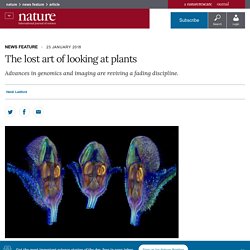
Kellogg studied plant morphology and systematics: scrutinizing the dazzling variety of plants’ physical forms to tease out how different species are related. But most of her colleagues had already pivoted to a new approach: molecular biology. “Every job suddenly required molecular techniques,” she says. “It was like I had learned how to make illuminated manuscripts, and then somebody invented the printing press.” How to Read a Book: The Ultimate Guide by Mortimer Adler. As part of our series on reading, this guide dives into how to read a book using the classical framework provided by Mortimer Adler.
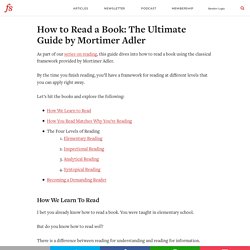
By the time you finish reading, you’ll have a framework for reading at different levels that you can apply right away. Let’s hit the books and explore the following: How We Learn To Read I bet you already know how to read a book. You were taught in elementary school. How to Think: The Skill You've Never Been Taught. No skill is more valuable and harder to come by than the ability to critically think through problems.
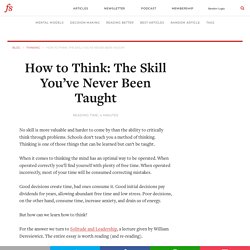
Schools don’t teach you a method of thinking. Thinking is one of those things that can be learned but can’t be taught. When it comes to thinking the mind has an optimal way to be operated. When operated correctly you’ll find yourself with plenty of free time. How to Use Deep Work to Kill Distractions and Boost Productivity. Deep work, as defined by author and professor Cal Newport in his best selling book, Deep Work: Rules for Focused Success in a Distracted World, is a concept born out of the difficulty many people have today in handling distractions caused by the boom in digital communications.
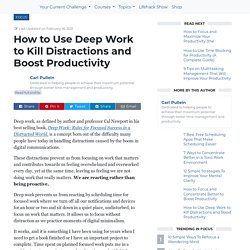
These distractions prevent us from focusing on work that matters and contributes towards us feeling overwhelmed and overworked every day, yet at the same time, leaving us feeling we are not doing work that really matters. We are reacting rather than being proactive. Writing a Doctoral (PhD) Dissertation. As I posted on Twitter in mid-May 2018, I’ve been reading a lot of books that focus on how to write a doctoral dissertation.
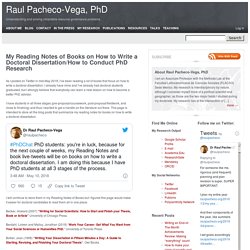
I already have mine and I’ve already had doctoral students graduated, but I strongly believe that everybody can learn a new lesson on how to become a better PhD advisor. I have students in all three stages (pre-proposal/coursework, post-proposal/fieldwork, and close to finishing) and thus I wanted to get a handle on the literature out there. CTE Online. 5 Step Prep to Make Essay Writing As Painless as Possible. Digital Tools. Blog.ed.ted. 23 Killer Sites for Free Online Education Anyone Can Use. Whether you’re five or ninety five, the internet has a lot to offer.
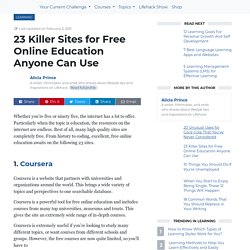
Particularly when the topic is education, the resources on the internet are endless. Best of all, many high quality sites are completely free. From history to coding, excellent, free online education awaits on the following 23 sites. 1. Core Strategies for Innovation and Reform in Learning. Find resources to help you implement six transformational strategies: project-based learning, social and emotional learning, comprehensive assessment, teacher development, integrated studies, and technology integration.
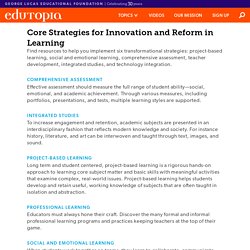
Comprehensive Assessment Effective assessment should measure the full range of student ability—social, emotional, and academic achievement. Through various measures, including portfolios, presentations, and tests, multiple learning styles are supported. Integrated Studies. Online Learning. The Covid-19 pandemic has rapidly increased the uptake of online learning, with many who might otherwise prefer to be in a classroom setting now having to learn or teach online.
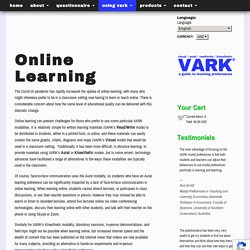
There is considerable concern about how the same level of educational quality can be delivered with this dramatic change. Online learning can present challenges for those who prefer to use some particular VARK modalities. It is relatively simple for written learning materials (VARK’s Read/Write mode) to be distributed to students, either in a printed form, or online, and these materials can easily contain the same graphs, charts, diagrams and maps (VARK’s Visual mode) that would be used in a classroom setting.
New Media Literacies. Explain Everything. Future Ready Frameworks - Future Ready Schools. DAPIP. DAPIP. DAPIP. DAPIP. DAPIP. Lynda: Online Courses, Classes, Training, Tutorials. Launches lyndaLibrary Offering Unlimited Off-site Patron Access to Award-Winning Courses Teaching Business, Technical and Creative Skills. How to Access Lynda’s Learning Database for Free. The Maze Hundreds Chart - Steve Wyborney's Blog: I'm on a Learning Mission. The Maze Hundreds Chart is a resource that is surprisingly powerful and leads to some very unexpected learning opportunities.
Much like The Animated Multiplication Table, this is a free, downloadable resource that will cause you to see an old, familiar chart in some new and surprising ways. Watch the video, download the interactive resource, and then take a look at the next blog post which will feature a variety of types of questions which you may never have been able to ask your students before seeing this resource. NOTE: Because this is a triggered PowerPoint document, it will need to be played in PowerPoint in order to have the interactivity shown in the video. Click here to download The Maze Hundreds Chart. Alt.News.
Learning 2021. Note.ED. Reviewable. Lessons Worth Sharing. Bonus. Bux.um. DIYO. Health Activities. Kinder Wunder. READ.ED. Teach/ Ideas. Educational Programs. Education Online. Open University - Systems. Free Online Course Materials.
Teacher. Educational Television. NewEd. Educare. Advise and Consent. Research. Referenda. Agape Muse. Attention Economy. Awareness. Historically. Langue tout parole. Memorabilities 2021. Musical Interests. Storied Interests. Pass It On. Convey Interest.